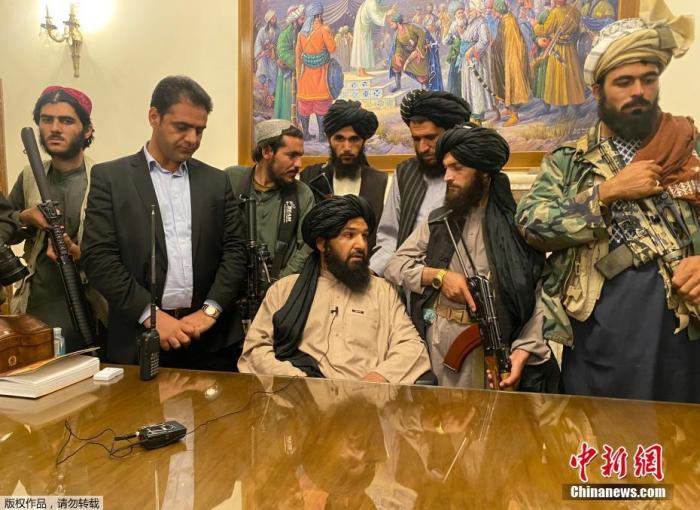(International Observation) Afghanistan's "changing sky" affects Central Asian nerves
China News Service, Nur-Sultan, August 17 (Reporter Zhang Shuo) Within a few days, the situation in Afghanistan changed dramatically.
With the Taliban’s announcement of a "peaceful invasion" of the capital Kabul, the region has once again become the focus of global attention, making the neighboring Central Asian countries nervous.
On August 15, local time, the Afghan Taliban entered the presidential palace.
According to reports, the Afghan Taliban spokesperson told Al Jazeera that in Afghanistan, the war has ended, and the ruling situation and regime will soon become clear.
After taking full control of Afghanistan, whether the Taliban's next actions will threaten the national security of Central Asia has aroused local concern.
In this regard, many Central Asian countries, including Kazakhstan, said that they will pay close attention to changes in the political situation in Afghanistan to take corresponding measures to ensure the safety of their citizens and diplomats in Afghanistan.
Kazakh President Tokayev said on social media on the 15th that he has asked relevant departments to protect the personal safety of Kazakh citizens and diplomats in Afghanistan.
The website of the President of Uzbekistan announced that Uzbekistan's President Mirziyoyev had spoken with Russian President Putin, and the two sides decided to strengthen cooperation between the various functional ministries and agencies of the two countries.
The Ministry of Foreign Affairs of Kyrgyzstan told the media that Kyrgyzstan pays close attention to the political and military situation in Afghanistan.
At present, the Kyrgyz Embassy in Afghanistan is still working normally and maintains close contact with Kyrgyz citizens in Afghanistan.
In addition, the Tajikistan Border Defense Bureau also issued a communiqu on the 15th, stating that the current situation in the area bordering Afghanistan and Tajikistan is stable.
The Ministry of Foreign Affairs of Tajikistan stated that Tajikistan’s consulates in the northern cities of Fazabad and Mazar-e-Sharif have been closed, but the embassy is still issuing visas to Afghan citizens.
The "changing" Afghanistan is currently in a state of chaos. The impact of the dramatic changes in the situation is self-evident. The spillover effect caused by this has already appeared, and the Central Asian countries adjacent to Afghanistan are the first to bear the brunt.
Although the Taliban claimed that they would ensure stability in the border area and would not conflict with countries in the region, Central Asian countries had to face problems such as the influx of refugees and border penetration by extremist forces.
The United States has previously stated that it hopes that the three Central Asian countries of Tajikistan, Kazakhstan and Uzbekistan can accommodate a certain scale of Afghan refugees.
However, the Central Asian countries have a clear attitude towards this and do not want to play the role of the "receiver" of refugees.
The Press Secretary of the President of Kazakhstan, Berek Vari, stated on the 16th that President Tokayev has not yet made a decision on accepting Afghan refugees.
The influx of refugees will not only cause a heavy social burden to the economically underdeveloped Central Asian countries, but also the influx of terrorists and drugs.
Experts from many countries pointed out that as the domestic situation in Afghanistan is precarious, all kinds of extremists are likely to appear in the border areas.
In response to the threat of changes in the situation in Afghanistan and the infiltration of terrorists from Afghanistan into Central Asian countries and Russia, Russia, Tajikistan, and Uzbekistan recently held joint military exercises in Tajikistan 20 kilometers away from the border with Afghanistan; before that, Uzbekistan Stan and Russia are also holding the "Southern-2021" joint military exercise at the Termez military base; earlier, under the "Border-2021" combat readiness inspection framework, Tajikistan also mobilized all of the country's military and powerful departments into a state of combat readiness for the first time .
Analysts generally believe that the “changing sky” in Afghanistan will profoundly affect the geopolitical structure of Central Asia.
On the one hand, as Russia’s traditional geostrategic rear, Central Asia is very necessary to ensure the security and stability of the region. Russian Defense Minister Shoigu and other officials have made a clear statement on this; on the other hand, the United States seeks to establish in Central Asia after its withdrawal from Afghanistan Military bases are "unacceptable" to Russia, and Central Asian countries are also cautious.
The recent frequent interactions between Central Asian countries and between Central Asian countries and Russia are also a response to changes in the regional situation.
(Finish)

